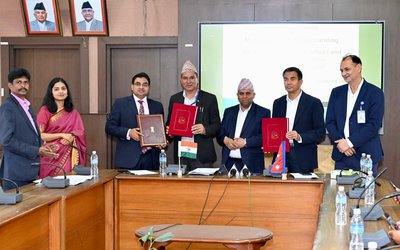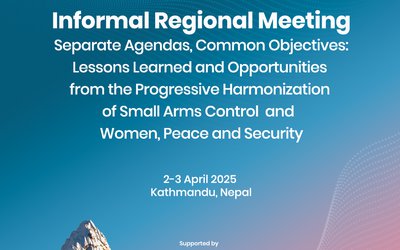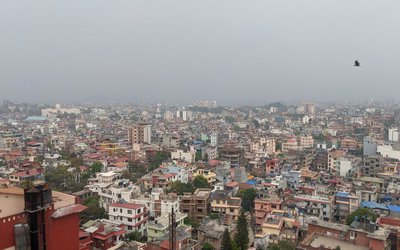This is not a spoof; it is the most commonsensical thing I’ve written in a long time. The world wanes…it truly does and it’s the fault of that same Homo sapiens that believes itself the measure of all things.
This is not something that has come to mind lately. In an early poetry collection in the 1970s I had included a poem called ‘The world wanes,’ and I wrote it when I had had an eyeful of forests denuded in the Chandragiris and the mechanical shovels gouging out the hillsides in Godavari. The human animal’s greed for cash has spared nothing. We have to progress.
Is it progress when conference rooms across the city are left with wastepaper baskets full of newly printed papers or bulletins? The painstaking work of writers, editors and printers rarely receive a glance before being carelessly dumped. ‘No room on the plane’ the usual excuse, but usually it is because conference participants come here with strict orders to bring back goodies not available next door or even further away. What is paper worth any way? One can always cut down more trees!
One of the most voracious rapes has been that of sand. Seen for generations as a ‘free good’ builders both commercially (paying for it) and non-commercially (not paying for it) have dug away at the closest riverbeds they can find. One day we are sure to sink down – how far is still to be seen. Who knows we might be taking one of those legendary journeys to the centre of the earth.
Concomitantly of course, the population is growing, not necessarily because more of us are born, although that adds up also, but because of people moving into the city. They no longer wish to farm. It’s hard work after all and, as each age progresses, Homo sapiens, is less and less inclined towards manual hard work if they can devise ways of avoiding it. Unfortunately, most of the methods devised ignore farming, the crucial bedrock of life on earth, not just human life, but all life!
People sell land to brick factories, tobacco factories and a plethora of industrial endeavours that don’t necessarily add nutrients to diets. They also sell land for resorts, so that the rich can enjoy something that a farmer’s child never will. But then the justification is and has always been that all our ‘projects’ will earn us much more than farming ever would; and without so much hard work.
Years ago myself and a group of like-minded people tried to draw the government’s attention to the Godavari marble quarry. At that time it was mining more rocks than marble and exporting the same. At that time, and still today small children could be seen, covered in dust hammering away at rocks. These children should have been in school but displaced from their villages they were living in shacks, with none or at the most one parent, around the periphery of the quarry. This was not the only quarry where this was happening. Our campaign against the quarry got us into trouble with our bosses when one of the owners complained about us. Not to be outdone a member of our team managed to find out how much tax the quarry paid to the government. It was less than I paid as an individual!
Lawyers for the Environment placed a case in court. The then prime minister, Krishna Prasad Bhattarai, was favourable to our case, but when the election was over his own party members and so-called ‘friends’ had ensured his defeat.
This campaign like most campaigns for the environment whimpered out. And so the world continues to wane. The forests will go unless they are protected properly. The hills will be gouged of greenery, the rivers will dry up. I’m not exaggerating this is a vision of the waning world. Even the mountains won’t last forever. Gradually the surfaces will be worn down by natural processes but you can be sure that as soon as someone finds a way to make money out of the ‘diminishing mountains’ that also will become the next best idea since ‘sliced bread.’ Sliced bread, yes. Think how excited people must have been to buy a loaf that they didn’t have to slice with a knife!
Meanwhile, there’ll be more such saving a seconds’ worth of work so that we can get on with other things. But wait-------the bread had to be sliced by someone, so the answer is as always to put people in factories where they can earn money and buy food that they could have grown had they not sold their land to get off the farms.
It sounds silly I know, and I do realise that what we reflect on as the idyllic farm life of our grandparents was damned hard work and at times just a tad better than subsistence and I am describing a mini version of the industrial revolutions elsewhere. I am doing so because people always suffer when revolutions occur; and usually it’s the poorest people. The tragedy of the commons deprived them of community resources and here, today, the wily politicians and industrialists of the world are led on by a new leader who can’t even devise a way to get people back to work without destroying more natural resources.
Should sand mining and cutting down trees not move you to fear ever such a teeny bit, how about fracking which seems to be causing sinkholes, currently big enough to swallow a car but in time maybe big enough to swallow a house. Well since we don’t appear to have any oil or coal deposits in Nepal, perhaps our houses won’t sink. I can almost hear that thought running through your minds as you read what I have written. Believe me, we’ll sink: even the clumsy method of digging up the same constructed road 4 or 5 times for 4 or 5 jobs that need doing and, when all’s said and done, could probably have been carried out consecutively will be enough to sink some of us.
The rationale behind bungling is that it prolongs every piece of work and that means some people have to be paid 2 or 3 times what it should have taken to complete a certain job. Unfortunately, many skilled workmen have left for better pay and more efficient work methods elsewhere. The country is waning not only because parts of it are being hacked down but also because its workers are leaving at an incredible rate and we are left carrying the can, as they say, and surveying the ever-present holes in the road. Looking at them, who’s to say the world isn’t waning?
- Hostage – A brief Review
- May 23, 2019
- Exodus 1 - From The Rhondda To The Calder
- Feb 09, 2019
- Exodus 1 - From The Rhondda To The Calder (Mid-1800s)
- Dec 08, 2018
- Why: A Look At Certain Strange Characteristics!
- Nov 02, 2018
- Where To Now?
- Oct 12, 2018















